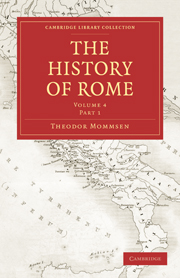Book contents
- Frontmatter
- PREFATORY NOTE
- Contents
- BOOK FIFTH THE ESTABLISHMENT OF THE MILITARY MONARCHY
- CHAPTER I MARCUS LEPIDUS AND QUINTUS SERTORIUS
- CHAPTER II RULE OF THE SULLAN RESTORATION
- CHAPTER III THE FALL OF THE OLIGARCHY AND THE RULE OF POMPEIUS
- CHAPTER IV POMPEIUS AND THE EAST
- CHAPTER V THE STRUGGLE OF PARTIES DURING THE ABSENCE OF POMPEIUS
- CHAPTER VI RETIREMENT OF POMPEIUS AND COALITION OF THE PRETENDERS
CHAPTER VII - THE SUBJUGATION OF THE WEST
Published online by Cambridge University Press: 10 November 2010
- Frontmatter
- PREFATORY NOTE
- Contents
- BOOK FIFTH THE ESTABLISHMENT OF THE MILITARY MONARCHY
- CHAPTER I MARCUS LEPIDUS AND QUINTUS SERTORIUS
- CHAPTER II RULE OF THE SULLAN RESTORATION
- CHAPTER III THE FALL OF THE OLIGARCHY AND THE RULE OF POMPEIUS
- CHAPTER IV POMPEIUS AND THE EAST
- CHAPTER V THE STRUGGLE OF PARTIES DURING THE ABSENCE OF POMPEIUS
- CHAPTER VI RETIREMENT OF POMPEIUS AND COALITION OF THE PRETENDERS
Summary
When the course of history turns from the miserable monotony of the political selfishness, which fought its battles in the senate-house and in the streets of the capital, to matters of greater importance than the question whether the first monarch of Rome should be called Gnæus, Gaius or Marcus, we may well be allowed—on the threshold of an event, the effects of which still at the present day influence the destinies of the world—to look round us for a moment, and to indicate the point of view under which the conquest of what is now France by the Romans, and their first contact with the inhabitants of Germany and of Great Britain, are to be regarded in connexion with the general history of the world.
By virtue of the law, that a people which has grown into a state absorbs its neighbours who are in political nonage, and a civilized people absorbs its neighbours who are in intellectual nonage—by virtue of this law, which is as universally valid and as much a law of nature as the law of gravity—the Italian nation (the only one in antiquity which was able to combine a superior political development and a superior civilization, though it presented the latter only in an imperfect and external manner) was entitled to reduce to subjection the Greek states of the East which were ripe for destruction, and to dispossess the peoples of lower grades of culture in the West—Libyans, Iberians, Celts, Germans—by means of its settlers; just as England with equal right has in Asia reduced to subjection a civilization of rival standing but politically impotent, and in America and Australia has marked and ennobled, and still continues to mark and ennoble, extensive barbarian countries with the impress of its nationality.
- Type
- Chapter
- Information
- The History of Rome , pp. 209 - 292Publisher: Cambridge University PressPrint publication year: 2010First published in: 1866



